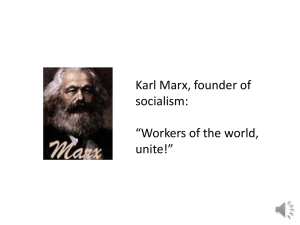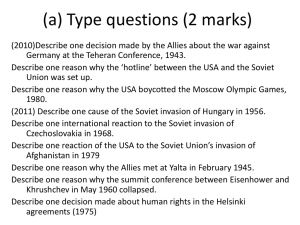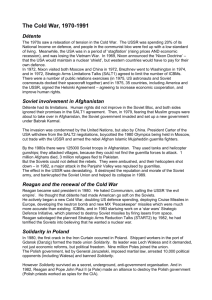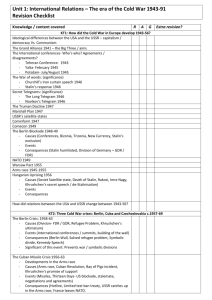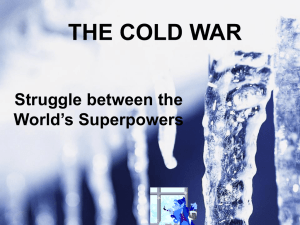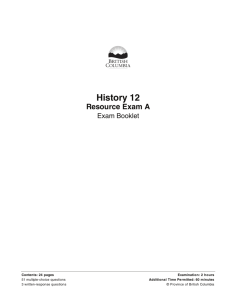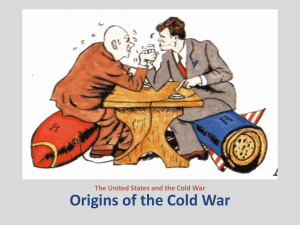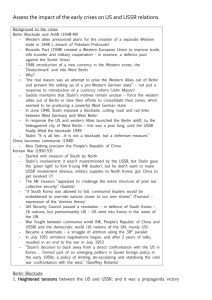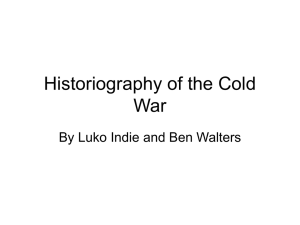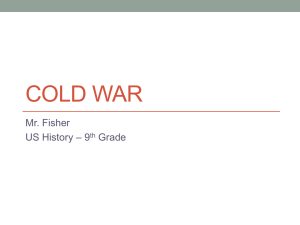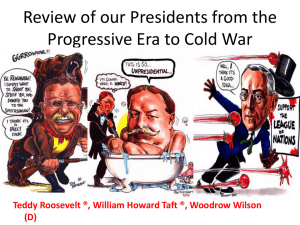World Politics in a New Era
advertisement
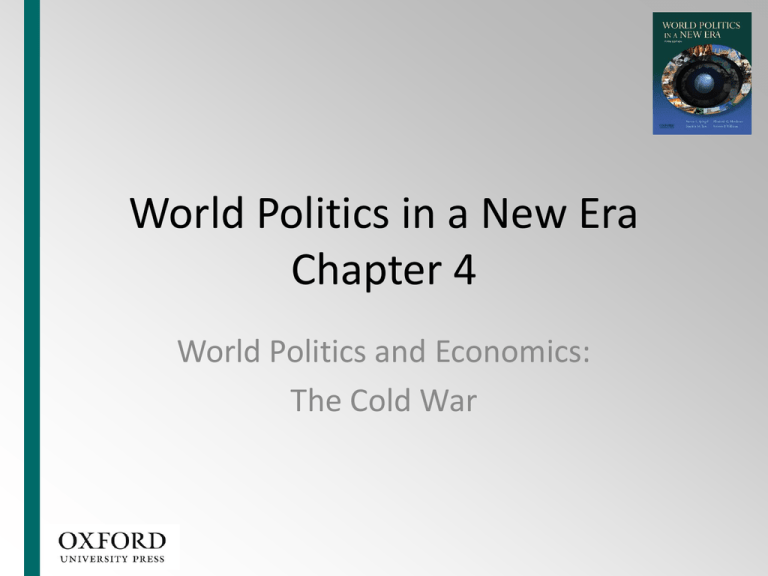
World Politics in a New Era Chapter 4 World Politics and Economics: The Cold War Causes of the Cold War • It was Moscow’s fault – Soviet aggression and expansionism – Domestic-level argument • No, it was Washington’s fault – Expand overseas markets – Use of atomic bomb – Domestic-level argument • Ideological conflict – Capitalism versus communism = inevitable conflict – Domestic-level argument Causes of the Cold War • Leadership – Truman and Stalin – Individual-level argument • Bipolarity – Realpolitik and the security dilemma – Systemic-level argument • It was all a misunderstanding – No hostile intentions but rather misinterpretation – Systemic-level argument Heating Up the Cold War • Initial confrontation: Iran – Soviets refused to withdraw but eventually backed down – United States determined that standing firm was best way to deal with USSR • The “Iron Curtain” descended – Churchill warned that an "Iron Curtain" was dividing Europe • Britain conceded leading role in world affairs to United States Early U.S. Policies • Truman Doctrine (1947) – Persuade Congress to authorize aid to Greece and Turkey – Aid to states attempting to resist communist insurgencies – The “declaration of the Cold War”? • Marshall Plan (1947) – Massive program of economic aid to the war-demolished nations of Europe – Three lasting effects • Revitalized western European economies • Thwarted communist influence in western Europe • Facilitated European economic and political integration Containment • U.S. strategic doctrine throughout Cold War • Prevent communist/Soviet expansion • George Kennan – “Long Telegram” – Application of counterforce • Novikov Telegram – United States striving for world supremacy • Both telegrams demonstrated lack of trust Berlin Blockade (1948-1949) • Closed all land access routes to the Westernoccupied sectors • The United States responded by organizing a massive airlift of basic necessities • Reinforced the USSR's aggressive reputation in the West • The USSR and the Western Allies took independent steps to set up governments in their occupied zones of Germany NATO and the Warsaw Pact • Creation of NATO in April 1949 – Role of Berlin Blockade – Nations of western Europe plus the United States and Canada – The first alliance the United States had entered into in peacetime • Creation of Warsaw Pact in 1955 – Soviet client states in eastern Europe Transformation of the World Economy • The United States emerged as hegemon – Dominated the world in terms of production – A massive increase in U.S. GNP – Increase in international trade and investment – Improvement in living standards • The Bretton Woods system (1945) – Designed to facilitate economic cooperation – Created IMF and the World Bank – In 1947, GATT sought to open world markets and increase trade Chinese Revolution • Struggle between communists and Nationalists • Declining strength and popularity of the Nationalist Kuomintang, led by Chiang Kaishek • In 1949, Chinese communists led by Mao Zedong won the civil war • Established the People's Republic of China • The Nationalists retreated to Taiwan NCS-68 • Communist victory in China and the USSR's test of an atomic bomb • The National Security Council prepared a controversial plan • NSC-68 called for the increase of U.S. armed forces • Rejected initially due to fear that the high military spending would ruin the U.S. economy The Korean War • Korea divided after World War II • Rigged election in the North brought Kim Il-Sung to power • Both the USSR and the United States withdrew their occupation forces by 1950 • In June 1950, North Korean forces attacked the South, attempting to unify the country by force • The Security Council authorized intervention into the war by a U.S.-led coalition The Korean War • • • • The U.S.-led UN intervention saved South Korea The Chinese intervened on the Northern side Stalemated along the 38th parallel Turning point in the Cold War – Adoption of NSC-68 and a large buildup of forces – U.S. involvement in Asia was increased – U.S.-Soviet and U.S.-Chinese conflicts heightened – The global U.S.-Soviet conflict worsened – Set a precedent for limited war The Third World • The USSR established ties with newly independent nations in Asia and Africa • The United States sought to limit Soviet influence in these developing countries – U.S.-engineered coup in Iran – CIA-backed coup in Guatemala – Suez Crisis • Nonaligned movement – Assert independence – Play superpowers off one another Berlin • In 1958, the Soviets demanded the Western Allies' withdrawal from Berlin • In 1961, the Berlin Wall was erected – East German authorities sealed off West Berlin with barbed wire and concrete barricades – An effort to stop the flow of refugees – Western sectors of Berlin were surrounded by the Berlin Wall, but West Berlin remained in Allied hands Cuban Missile Crisis • Soviet medium-range nuclear missiles detected by U.S. intelligence • The resulting crisis was the most acute of the Cold War – The United States instituted a blockade – The USSR agreed to withdraw the missiles in exchange for U.S. concessions Cuban Missile Crisis • Results – Relaxation of Cold War tensions – Agreement on a limited nuclear test ban treaty – Establishment of the Moscow-Washington "hotline" – The USSR began building up its nuclear forces at tremendous cost – Americans became overconfident and now underestimated the difficulties of containing communism in the Third World The Vietnam War • 16,000 U.S. military advisors in South Vietnam • In 1965, U.S. combat forces in Vietnam to forestall a communist victory • By 1968 the United States had more than 500,000 soldiers fighting in Vietnam • U.S. troops, military aid, and bombing campaigns failed to defeat the Vietcong • The United States could not strengthen the corrupt South Vietnamese regime • Vietnam fell to the communists in 1975 The Apparent Decline of U.S. Economic Hegemony • Growth of economies of Europe and Japan • The United States developed a currentaccount deficit • The “Nixon Shock” occurred in 1971 • In 1973, the fixed exchange rate system was ended • International economic relations took on a more multilateral cast Detente • In February 1972, U.S. President Nixon visited China • Visit signaled new flexibility in U.S. policy • Nixon and Kissinger also sought to improve U.S.Soviet relations – Acknowledged the USSR's superpower status and attainment of strategic parity with the United States • Moscow Summit – SALT I – Economic and trade agreements Tensions in Detente • The United States and USSR had different goals and expectations for detente – The United States hoped to avoid confrontations and challenges to each other’s vital interests – The USSR expected the Cold War competition to continue • The Arab-Israeli War of 1973 – An alert of U.S. nuclear forces – Arab oil embargo against the United States The End of Detente • Carter emphasized interdependence, economic factors, and human rights – Carter and Brezhnev signed SALT II in 1979 – Soviet belief that the United States would not oppose Soviet expansion in the Third World • Invasion of Afghanistan – Attempt to install a more strongly pro-Soviet regime – Widely denounced in the West and Third World – Economic sanctions and withdrawal of the U.S. team from the Moscow Olympics in 1980 Reagan and the Reagan Doctrine • More assertive form of containment • Reagan labeled the USSR the “evil empire” • Reagan Doctrine: increased U.S. support for anticommunist insurgencies in the Third World • Examples: Angola, Cambodia, El Salvador, Guatemala, and Nicaragua • Controversial and expensive improvements in U.S. military forces The Gorbachev Era • Policies of glasnost (openness) and perestroika (economic restructuring) • USSR refused to prop up communist regimes • Mass uprisings resulting in the collapse of communist regimes • Abortive coup by hard-line communists in the USSR failed in 1991 • Discrediting of Soviet regime • Disintegration of Soviet Union by end of 1991 Why Did the Cold War End? • The Gorbachev factor – Gorbachev's leadership and policies – “Great-man” theory – Individual-level explanation • The failure of communism – Internal changes in Soviet policy and society – Triumph of capitalism over communism – Domestic-level explanation Why Did the Cold War End? • End of the evil empire – Soviet Union became too weak to challenge the United States and ultimately collapsed – Variant: economic and military competition with the West – Essentially a systemic-level explanation • Decline of bipolarity – Real "winners" of the Cold War – Unipolarity or multipolarity? – Systemic-level explanation
